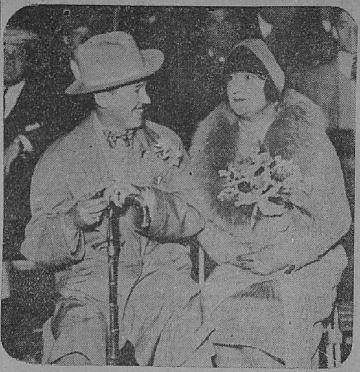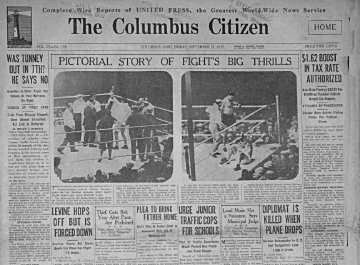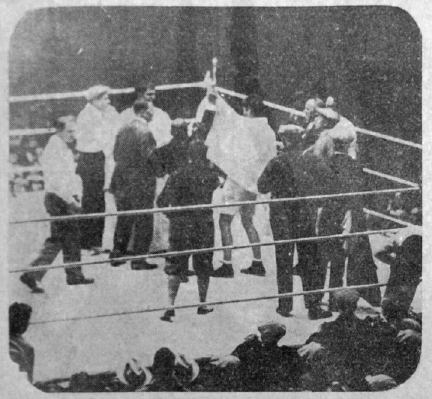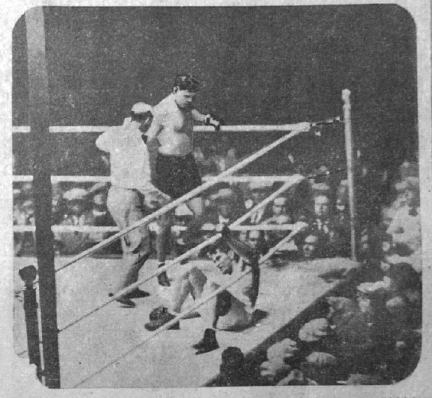
HISTORIC BOXING NEWSPAPERS
You will enjoy reading these historic
newspapers and
articles. Some of the
greatest boxing events from the 1800's
through modern
history.
|
THE COLUMBUS CITIZEN
FRIDAY, SEPTEMBER 23, 1927
GENE TUNNEY vs JACK DEMPSEY
|
WAS TUNNEY
OUT IN 7TH?
HE SAYS NO
Question is Chief Topic
For
Debate At Post Mortems
On Fight
EXODUS OF TIRED FANS
Exits From Chicago Clogged;
Gene Almost Unmarked
But jack Is Battered
|
By HENRY L. FARRELL
United Press Staff Correspondent.
_
CHICAGO, Sept. 23. - The
question of whether gene
Tunney could have arisen
without 10 seconds of the time
he was knocked down by Jack
Dempsey in the seventh round
of their championship fight
last night, and whether he
would have stayed up if he
had not been given three or
four seconds' leeway, over-
shadowed all others today in
the inevitable "post mortems"
of the fight.
_
Sport writers in the main agreed
that "rules are rules" and that the
rule of Illinois State Boxing
Commission requiring the victorious
fighter to go to a neutral corner
after a knockdown is a good one.
_
That, nevertheless, does not an-
swer the question of whether Gene
was knocked out in accordance with
the Queensbury rules. He said he
could have been on his feet at the
count of four - about seven or eight
seconds after the knockdown.
_
Tunney's version is that he looked
toward his handlers and they mo-
tioned him to stay down and rest.
_ _ APPEARED DAZED.
_
Perhaps he could have been up
sooner. It is fully within the range
of possibility. But to most of the
observers at the ringside it appeared
that Tunney arose when he did only
with great difficulty and that he was
thoroughly dazed when he hit the
canvas.
_
Leo Flynn, manager of the chal-
lenger, claimed a stop watch in the
Dempsey corner showed 15 seconds
from the knockdown to the last sec-
ond of the count. It was actually
three seconds before Dempsey got
to a neutral corner and the referee
started to toll off the period of
grace.
_ _ _JUDGE'S VIEW.
_
George Lytton, one of the two judges
who awarded the decision to Tunney
who awarded the decision to Tunney
on points, is one of those who be-
lieves the champion was out for 10
seconds.
_
"There have been many who be-
lieved Tunney could have arisen
sooner," Lytton said. "I do not be-
lieve he could.
_
"In my opinion, Dempsey would
have been champion today if he had
moved faster in getting into the far
corner."
_
"But rules are rules and Tunney
deserved to win."
_
The opinion expressed by Lytton,
an amateur boxer of considerable
reputation, met with general ap-
proval of a majority of those who
saw the fight. Only the rapid par-
tisans of the Tunney and Dempsey
camps differed.
__
_ A GOOD RULE.
_ The
purpose of the rule is obvious.
It is designed to prevent the boxer
scoring the knockdown from follow-
ing up his advantage before his op-
ponent has a chance to regain his
balance. It is conceded to be a good
rule and Dempsey has contended for
it with others.
_
As to the fairness of Referee Dave
Barry, he gave a shade to Demp-
sey if he did to anyone. Jack un-
questionably used a rabbit punch
several times. Barry cautioned him
about it but didn't penalize him.
Dempsey wasn't "called" either for
blows that looked low. The latter,
however, were less serious in this
instance than the pounding on the
back of Tunney's head and were
probably unintentional.
_
All in all, it looks as if Dempsey
got a bad "break" or maybe it should
be that Tunney got a good one.
But it can scarcely be denied that
the decision was fair.
_
_ BEDRAGGLED CROWD.
_
Bedraggled thousands, many nurs-
ing headaches and others sniffling
with colds, fought today for a
chance to ride on trains leaving Chi-
cago, just as they had fought for
hotel rooms earlier in the week and
fought for their seats in Soldiers'
Field last week.
_
For the most part the fans seemed
to have recovered from the touch
of hysteria of recent days. Besides,
many of them were much more in-
terested in cracked ice and quiet
than in fine points of boxing.
_
Soldiers Field was a desolate
waste of broken seats and miscel-
laneous debris. A few guards and
workmen took the place of the 145,-
000 fight-crazed fans who were in it
last night.
_ _ NOT
A SELL-OUT.
_ It
wasn't a sold-out house, and
Tex Rickard's $3,000,000 dream
proved too optimistic. But with the
aid of cut rates on the ticket sales,
the crowd was swelled to a record
for a prize fight - a record which
may stand for years to come.
_
It was, in some ways, an unusual
crowd that saw the battle. It had
what many fighters lack - a change
of pace. Never was there a more
reserved and distant assemblage of
persons than those 145,000 during
the early part of the evening. The
preliminary fights failed to draw
comment from any but the most
hardened fans.
_
But when Dempsey and Tunney
appeared, it was suddenly changed
into a wildly howling mob which
kept on howling until the 10 furious
rounds were over. It cheered for
Jack and it cheered for Gene; it
booed Jack when he hit low and
booed Gene when he turned to danc-
ing and backward racing after he
was knocked down in the seventh
round. It cheered again for the
champion when he hammered his
opponent in the last two rounds,
and went wild when the referee
raised Tunney's hand to show what
almost everyone already knew -
that Gene had retained the crown
he won last year at Philadelphia.
_ Then
the crowd did one of the
most remarkable things in ring his-
tory - more than half of the throng
stayed for the two "preliminary bouts"
saved for after the main go.
_
It was a crowd of celebrities and
nobodies mixed - except in the first
dozen rows.
_
Altho besought by many of his
friends of the "gold coast" - Chi-
cago's inner circle of society - to join
them in a party at the racquet club
after the fight, Tunney went with
his trainers and old friends to the
roof bungalow of a Chicago hotel, to
hold a jubilee with the men who
helped him win and retain his title.
_
Late today he will start for Cleve-
land, where he again will hobnob
with millionaires, the Hanna broth-
ers, son of the late U.S. Senator
Mark Hanna.
_ _ GENE
PLEASED.
_ In
the dressing room Tunney com-
plimented his opponent, saying that
Dempsey "fought a typical Dempsey
battle but that this year he was very,
very much better than he was a year
ago."
_
The champion showed only a few
marks of the contest, but complained
that his hands had been too tightly
taped. Because of this he was un-
able to shake hands with the many
well-wishers who thronged in to see
him.
_ _ GOES TO ESTELLE.
_
Dempsey, bruised and mauled phy-
sically and perhaps worse battered
in morale, went to the chic and sym-
pathetic Estelle Taylor for sympathy
after the fight.
_
Estalle had seen her husband only
on occasional brief visits to his train-
ing camp since they arrived here to-
gether when Dempsey started train-
ing for the fight.
_
She sat in her suite at the Edge
water Beach Hotel during the fight.
When it was over and she was told
Tunney had won, she was hysterical
for a few minutes. By the time
Dempsey arrived, however, she was
calm.
_
"Everything's all right, honey,"
he assured her.
_
"I'm glad it's over," she said.
_ _ FACE PATCHED UP.
_ A few
minutes afterwards a phy-
sician was called, presumably to
make sure Dempsey's injuries were
not serious. He called for cracked
ice for the former champion's
bruised face, but made no report on
his condition.
_
All the Dempsey attaches who
went to the hotel with him were
loudly indignant over the result of
the fight. They insisted with evi-
dent sincerity that he had been en-
titled to a knockout when Tunney
went down in the seventh round.
|
MR. TUNNEY PROVES THE
MORAL THAT A MAN MAY
BE DOWN BUT NOT OUT
|
|
__ By
ALFRED SEGAL.
_ Those
who like point moral
lessons to children must here-
after present the unforgettable Mr.
Tunney as the shining example of
the man who was down but not
out, coming up at the count of nine
and winning his battle.
_
Mr. Tunney in the role of moral-
ist enacted his object lesson before
150,000 people and certainly no
preacher pointing the courageous
way of life ever had such an audi-
ence.
_
Certainly calamity was upon Mr.
Tunney. Mr. Tunney lay almost
on his back, one hand on the floor
and the other on the ropes. Mr.
Tunney looked surprised at the ap-
proach of disaster. Life was such
a funny proposition. A few min-
utes before he had entered the ring
in his rob, the people acclaim-
ing the champion.
_
But now Mr. Tunney seemed
puzzled and pained. The referee
was counting:
_ "ONE!"
_
The world seemed to be against
Mr. Tunney then, and many who
had supported his cause, now
turned and cheered his downfall.
Mr. Tunney seemed quite alone in
the world.
_
"TWO!"
_
Mr. Tunney still was down.
What a brave figure he had made
in his blue and red raiment leap-
ing over the ropes. In a path of
glory he had walked thru the mul-
titude on his way to the arena
with the swing of champions. The
people stood on their chairs the
better to witness his downfall.
_ "THREE!"
_
Mr. Tunney was still proud even
in his travail; he did not permit
his body to touch the dust. With
a mighty effort he supported it on
his arms, one hand on the floor
and the other holding the rope.
The world howled like a wolf at
Mr. Tunney.
_
"FOUR!"
_
Those who were advantaged so
that they could see Mr. Tunney's
face observed that it had a solemn
look. Mr. Tunney seemingly was
giving thought to his unhappy
plight.
_
"FIVE!"
_
Mr. Tunney had five more sec-
onds to go. Five more and Mr.
Tunney would step over into the
oblivion that lies at the other end
of the path of glory. A short
while before two who had gone
that way had stood in the ring and
bowed to the people. One was a
bald old man named Jeffries and the
other was that Sharkey who is the
Lithuanian. The multitude was
lifting its arms to count with the
referee.
_ "SIX!"
_
Alas! Mr. Tunney had walked
with a high head in the world, a
proud man. Now many who had
been rejoicing now commenced to
pity him. And the gentle police-
man near the ringside said, "The
poor devil!" And the philosophical
fireman responded "it's the way of
the world!"
_ "SEVEN!"
_
The second moved swiftly. Mr.
Tunney seemed a man tied to the
swift-moving hand of a clock re-
volving him toward an evil des-
tiny. "He's done," said the gentle
policeman.
_ "EIGHT!"
_
Two more seconds for Mr. Tun-
ney. But how courageously he
holds himself above the dust! The
muscles of the arm that is sup-
porting him above the floor seem
to twist with the mighty effort.
Now silence falls upon the multi-
tude. Who may howl at the dy-
ing? Poor Mr. Tunney!
_ "NINE!"
_
It was well that the ring was
illuminated as if by sunlight for
that which happened deserved to
be seen in the fullness of the light
of the world.
_
Mr. Tunney lifted himself to his
feet. Mr. Tunney leaped at once
at his adversary, striking blow on
blow. Mr. Tunney had been down
but not out, and those who had
howled derision at his disaster now
cheered with a full heart for the
might of the human spirit. The
ring was Mr. Tunney's stage and
he acted a good part before the
mightiest audience that ever as-
sembled in America.
_
Surrounding him were the 150,-
000 of his fellow-mortals who felt
rather than understood the moral
implications of Mr. Tunney's re-
turn from the edge of defeat.
_
They had begun to come to the
stadium at dusk in massed forma-
tions on the roads leading to the
ring. There was a man on the
road who pressed into their hands
certain tracts in which he recited
how, from misery, he had come to
happiness by walking with God.
But his tracts were strewn on the
roads.
_
They threw away his tracts and
rushed on to fall into the hands of
that far more effective moralist,
Mr. Tunney.
_
And so it went to the unhappy
end for the other one, Mr. Demp-
sey. Where there were many to
applaud his entrance, there was
none to cheer him now.
_
But the gentle policeman said
to him as he passed: "Too bad,
Jack."
_
And the philosophical fireman
said: "It's all in a lifetime, Jack."
_
Now, when the crowd issued
from the stadium, numerous men
presented the people with pam-
phlets, which read:
_
"What difference will it make
1000 years from now?"
_
"What will it matter whether
you -
_
"Lived in a mansion or a cot-
tage?
_
"Covered your feet with silk or
cotton socks?
_
"Ate chicken or liver and onions?
_
"Slept on a brass bed or on a
cot?
_
"Had a million in the bank, or
nothing at all?"
_
The crowd might have answered:
"Well, gentlemen, nothing really
matters but such a thing some-
how has a bit more importance
than many other things."
_
As the philosophical fireman
said to the gentle policeman when
it was all over: "Doesn't it beat
everything the way a man can
get up?"
|
|
_
These
photos show the big moments of the Tunney-Dempsey bout in Chicago
Thursday night - the two thrilling moments which nearly 150,000 persons
paid nearly $3,00,000 to see.
The above photo shows Tunney being given the decision at the end of the
bout while cheers of Tunney's friends mingled with the jeers of
Dempsey's admirers. It was hard to tell whether fans liked, or
disliked, the decision.
_
The photo below shows Champion Gene Tunney down for the only clean
knockdown of the fight in the seventh round. He took a long nine count
before leaping to his feet to rush into a clinch and cover up for the
rest of the seventh and most of the eighth.
|
|
_
It
was that knockdown which made the fight. Until that time Tunney had
been cautious. Dempsey had tried every known way to get the champion to
open up and fight but instead Gene had stayed in his shell, countering
when Dempsey led but never opening up. Somehow or other Dempsey got
thru that careful defense, hammered Tunney to the ropes and then
flashed over the knockdown wallop.
_
Seeing his title slipping, Tunney started fighting for the first time
during the evening. He was still cautious, still the watchful waiter,
but he occasionally did strike one. Several time he actually led. And
it was this closing round aggressiveness, after Dempsey had carried the
burden of the fight for eight rounds, which won the decision for Tunney.
|
MR. RICKARD NETS
ABOUT $700,000
|
|
By United Press.
_
CHICAGO, Sept. 23. - Statis-
tics of the championship
_
Estimated attendance, 145,000
_
Estimated receipts, $2,800,000
_
Tunney's purse, $900,000
_
Dempsey's purse, $450,000
_
Federal tax, $280,000
_
State tax, $252,000
_
Rent for stadium, $100,000
_
Incidental expenses, $100,000
_
Profit for Madison Square
Garden Corp. and Tex Rickard,
$718,000
|

Mr. and Mrs. Roy W. Howard at the Ringside
|
|
_ After
arranging the great 70-
station N.B.C. broadcast of
the Dempsey-Tunney fight so that
millions could enjoy it thru their
home radios, Roy W. Howard of
the Scripps-Howard newspapers,
and Mrs. Howard saw the fight
themselves from ringside seats.
Apparently Mr. Howard was hav-
ing a good time when the camera
was turned on him.
|
500,00 "SEE"
FIGHT BY RADIO
That Many Local and Central
Ohio Fans Enjoy Citizen's
Broadcast Party.
|
|
_ Five
hundred thousand persons in
Columbus and central Ohio, it was
estimated Friday, were guests of
The Citizen's vast broadcasting par-
ty Thursday night.
_
Broadcasting of the fight was
made possible by the Scripps-Howard
League, of which The Citizen is a
member.
_
Fight fans of the Columbus and Cen-
tral Ohio tuned into WAIU.
_
Up to the minute of the fight,
radio dealers were busy installing
radio sets for the epoch-making
broadcast. Many of them were
swamped with last-minute orders.
_
_NEIGHBORHOOD PARTIES.
_ Those
who didn't have sets of their
own went over to the neighbors for
the occasion.
_
In some neighborhoods, generous-
hearted set owners put their loud
speakers out on the porch or out
on the sidewalk to accommodate big-
ger crowds.
_
For the rest, radio stores, music
stores and theaters supplied the ra-
dio story of the fight.
_ _ Radio returns were
received at
Heaton's, the Wurlitzer Store, Doyles,
Linden the Columbus Auditorium.
_
Listeners in hospitals, fire sta-
tions and the police headquarters
thrilled to Graham McNamee's words
as they shot from the loud speaker.
_
Several filling stations, even, set
up sets for the accommodation of
their patrons.
|
FIGHT ON GREAT
RADIO HOOK-UP
McNamee's Story
of Bout
Heard by World Thru Scrpps-
Howard Efforts.
|
|
Special to The Citizen.
_
NEW YORK, Sept. 23. - The great-
est network of radio stations ever to
broadcast a sporting event - 69 in
number - put the Tunney-Dempsey
bout on the air last night under the
auspices of The Citizen and the 25
other Scripps-Howard newspapers.
_
When Jack Dempsey and Gene
Tunney stepped into the ring, the
voice of the announcer was heard
by more people than ever before
listened to the description of a simi-
lar event thru the medium of radio
broadcasting.
|
JACK'S PA ALMOST
PUTS ON SCRAP
|
|
By United Press.
_
CHICAGO, Sept. 23. - Jack
Dempsey's father, Hiram
Dempsey, of Salt Lake City,
Utah, almost had a fight of his
own on Soldiers' Field last
night.
_
The older Dempsey was in the
"ringside" section. A row in
front was a vociferous Tunney
partisan.
_
"Kill the dirty slacker," he
yelled as Tunney pounded his
rival.
_
Hiram Dempsey stood on his
seat and shook his fist at the fan.
_
"You stop that; the war's
over now," he shouted.
_
He said after the fight he be-
lieved the worst his son should
have received was a draw.
|
NAMED AFTER CHAMP
Baby Called Gene Tunney Reynolds
After Seven Weeks of Waiting
|
|
By Citizen State Wire
_ TOLEDO, Sept. 23. - Gene Tunney
Reynolds' name was established
Thursday night. Gene has waited
seven weeks for a name, so he could
have the cognomen of the winner of
the fight as a starter in life.
|
|

THE COLUMBUS CITIZEN
FRIDAY, SEPTEMBER 23, 1927
|
Historic boxing newspapers and
articles.





